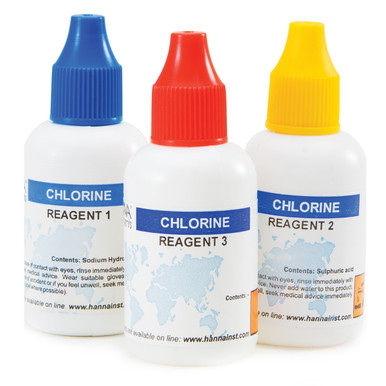
Total Chlorine Test Kit
The HI3831T is a chemical test kit that uses the DPD method to measure total chlorine. The HI3831T is supplied complete with all of the reagents and equipment necessary to perform approximately 50 tests.
- Pre-made reagents for ease of use
- All reagents marked with expiration date and lot number for traceability
- Color comparison cube for simple determination
*Products classified as Dangerous Goods can only be shipped via ground.
The HI3831T is a colorimetric chemical test kit that determines the total chlorine concentration within a 0.0 to 2.5 mg/L (ppm) range. The HI3831T is supplied with all of the necessary reagents and equipment to perform the analysis. The test kit contains enough reagents to perform approximately 50 tests.
Features at-a-glance
Complete setup
- All required materials are included with the test kit, such as the sample beaker, color comparison cube, and reagent dropper bottles.
High resolution
- Readings from 0.0 to 2.5 mg/L are determined to 0.5 mg/L resolution.
Replacement reagents available
- There is no need to buy a new kit when reagents are exhausted. The HI3831T-050 reagent set can be ordered to replace the reagents supplied with the kit. This reagent set comes with 1 (20mL) dropper bottle of chlorine reagent 1, 1 (15mL) dropper bottle of chlorine reagent 2, and 1 (15mL) dropper bottle of chlorine reagent 3.
Significance of Use
The chlorination of water supplies and polluted waters is used mainly to destroy or deactivate disease-producing microorganisms. Chlorine also serves to improve the quality of drinking water, as it reacts with ammonia, iron, manganese, sulfide, and some organic substances. Nevertheless, high amounts of chlorine will produce adverse effects like the formation of compounds that are potentially carcinogenic (e.g. chloroform) or harmful to aquatic life (e.g. chloramines). It remains essential to control the amount of added chlorine in order to fulfill the primary purpose of disinfecting while also minimizing any adverse effects.
Keep extra testing supplies on-hand
Resources
- Specifications 1 2 3 4 5 6 7 8 9 10
- Manuals 11 12 13 14
| Specification | Detail |
|---|---|
| SKU | HI3831T |
| Type | colorimetric |
| Smallest Increment | 0.5 mg/L (ppm) |
| Method | DPD |
| Number of Tests | 50 avg. |
| Ordering Information | HI3831T test kits comes with color comparison cube, 20 mL chlorine reagent 1, 15 mL chlorine reagent 2 and 15 mL chlorine reagent 3 |
| Reagent | HI3831T-050 |
| Total Chlorine Range | 0.0-2.5 mg/L (ppm) |






